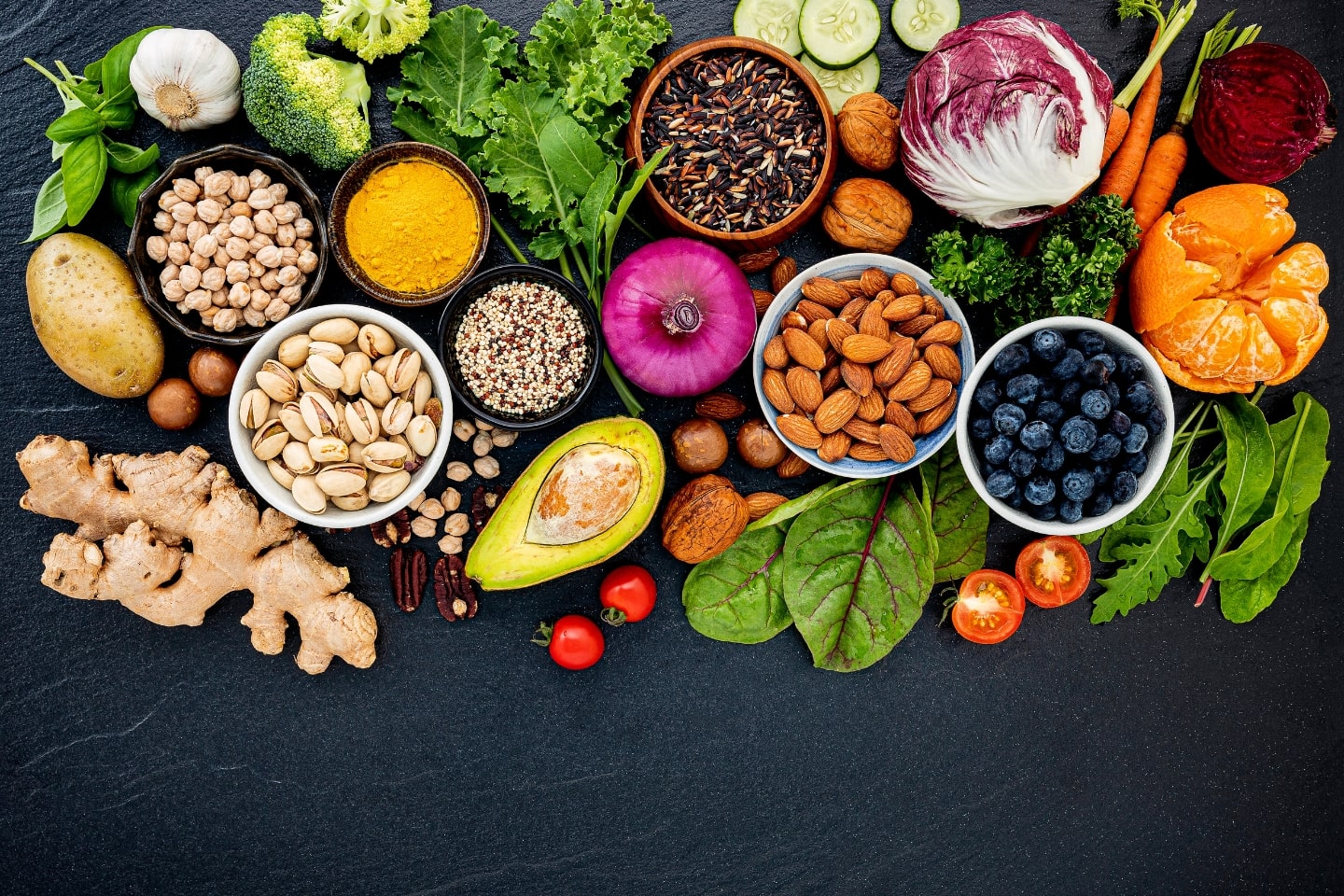10 Foods You Should Eat Every Day for a Healthy Diet

You know that feeling when you open your fridge, stare into it like it’s a mysterious cavern, and wonder, What should I be eating today? Same. It’s one of life’s little daily puzzles. Between conflicting diet trends, influencer advice, and endless supermarket aisles, it’s easy to feel like healthy eating is an impossible jigsaw.
But here’s the thing: healthy eating doesn’t have to be complicated. You don’t need to follow the latest “miracle” superfood trend or obsess over macronutrient charts to nourish your body. Instead, focus on adding a variety of wholesome, nutrient-dense foods to your plate each day. And the great news? Many of these powerhouse foods are probably already in your kitchen, or at least easy to find at your local store.
So, let’s talk about ten types of food you should aim to eat every single day to help keep your body thriving and your taste buds happy. And don’t worry. No kale-only salads or bland steamed veggies required. Let’s keep it real, delicious, and doable.

1. Colorful Vegetables: Nature’s Multivitamins
We know vegetables are hardly breaking news. We’ve been told since childhood to “eat our veggies,” and for good reason. But here’s where it gets interesting, the magic lies in the colors. The pigments that give veggies their vibrant hues are packed with phytochemicals, which are natural compounds that help fight inflammation, protect your cells from damage, and lower your risk of chronic diseases like heart disease, certain cancers, and even cognitive decline as you age.
It’s like nature’s pharmacy on your plate. And here’s the cool part, the more variety you eat, the more you’re covering your nutritional bases. Different colors mean different nutrients and different benefits. So try to make your meals look like a rainbow. Toss spinach into smoothies, roast vibrant bell peppers for fajitas, or add shredded purple cabbage to slaws. Your palate stays excited, and your body gets a powerhouse dose of protection every single day.
Why it matters:- Orange and yellow veggies like carrots and bell peppers contain carotenoids that support eye health.
- Green veggies such as broccoli, spinach, and kale are rich in folate, fiber, and compounds like sulforaphane.
-
Red and purple veggies like beets and red cabbage have anthocyanins that support heart health and cognitive function.
Toss spinach into smoothies, roast colorful peppers for fajitas, or add shredded carrots to pasta sauce. Variety keeps your palate happy and your body nourished.
2. Fruits: Sweetness With Benefits
You might be wondering, Wait, isn’t fruit loaded with sugar? Yes, fruit does contain natural sugars, but it’s bundled up with fiber, water, vitamins, and antioxidants, making it a far cry from the refined stuff in soda or candy. Here’s the thing, the fiber in whole fruit slows down how quickly your body absorbs those natural sugars, helping to keep your blood sugar levels steady instead of spiking and crashing like they would after a can of soda.
Plus, fruits bring along an entire entourage of benefits that processed sweets can’t touch. They’re bursting with vitamins like vitamin C, essential for immune health and glowing skin. They deliver minerals like potassium, which helps keep your blood pressure in check. And let’s not forget the antioxidants, those powerful little compounds that help protect your cells from damage and may lower your risk of chronic diseases like heart disease and certain cancers.
And there’s the pure enjoyment factor. Biting into a crisp apple or tasting the juicy sweetness of a ripe peach is one of life’s simple pleasures. So, while fruit is sweet, it’s the good kind of sweet, the kind that nourishes your body and satisfies your taste buds all at once.
Why it matters:- Berries like blueberries and raspberries are rich in antioxidants that help protect your brain from aging.
- Apples and pears are high in fiber, which helps regulate blood sugar and keep digestion moving smoothly.
-
Citrus fruits provide a hefty dose of immune-boosting vitamin C.
Keep a bowl of washed fruit on the counter for easy snacking, stir berries into oatmeal, or add sliced oranges to salads for a burst of flavor.
3. Whole Grains: The Real Carb Story
Carbs have taken a beating over the past few decades. But not all carbs are created equal. Whole grains still have all their original parts: the bran, germ, and endosperm. This means they’re loaded with fiber, vitamins, minerals, and antioxidants . Unlike refined grains, which are stripped of many nutrients during processing, whole grains keep all those beneficial components intact, offering steady energy instead of quick sugar spikes and crashes.
Plus, they bring so much more to the table than just being a carb. Whole grains like oats, brown rice, barley, and quinoa support heart health, help manage weight, and keep your digestive system running smoothly. They’re satisfying, versatile, and add a nutty, wholesome flavor to your meals that white bread just can’t compete with.
Why it matters:- Fiber helps lower cholesterol and stabilizes blood sugar.
- Whole grains support healthy digestion and promote a feeling of fullness.
-
Studies link whole grain consumption to reduced risks of heart disease, type 2 diabetes, and certain cancers.
Swap white rice for quinoa or farro, choose whole-grain bread, or cook a big pot of steel-cut oats for the week.
4. Healthy Fats: The Good Guys
Fat isn’t the enemy. It’s essential for absorbing vitamins, keeping your brain sharp, and maintaining cell health. The trick is choosing the right kinds. Healthy fats like monounsaturated and polyunsaturated fats do wonders for your body. They help lower bad cholesterol, reduce inflammation, and even support mood and mental health.
Think of fats as a team with different players bringing unique skills. Avocados, nuts, seeds, and olive oil are packed with heart-healthy monounsaturated fats, while fatty fish like salmon and sardines provide omega-3s that protect your heart and keep your brain functioning smoothly. Even your skin benefits from healthy fats, staying supple and glowing rather than dry and dull.
So rather than avoiding fats altogether, embrace the good ones in moderation. Drizzle olive oil over salads, toss walnuts into oatmeal, or enjoy some avocado on toast. Your body will thank you for it.
Why it matters:- Monounsaturated fats like those in olive oil and avocados help lower LDL (“bad”) cholesterol.
-
Omega-3 fatty acids found in fatty fish, walnuts, and flaxseeds reduce inflammation and support heart health.
Drizzle olive oil over roasted veggies, add avocado to toast, or sprinkle ground flaxseed into yogurt or smoothies.

5. Nuts and Seeds: Tiny but Mighty
Nuts and seeds might look small, but they pack a powerful punch of nutrients. They’re rich in protein, fiber, healthy fats, and important minerals like magnesium and zinc. Despite their size, these little guys are nutritional powerhouses that can make a big impact on your health.
Magnesium helps regulate muscle and nerve function, blood sugar levels, and blood pressure, while zinc plays a crucial role in supporting your immune system and keeping your metabolism humming along. Plus, nuts and seeds are loaded with antioxidants, which help protect your cells from damage and fight inflammation in the body.
They’re also incredibly versatile. You can sprinkle chia seeds into smoothies, toss sunflower seeds onto salads, or grab a handful of almonds for a satisfying snack that keeps you full between meals. And let’s not forget, they add amazing crunch and flavor to everything from oatmeal to stir-fries.
Why it matters:- Regular nut consumption is linked to lower rates of heart disease and improved cholesterol levels.
-
Seeds like chia and flax are excellent sources of plant-based omega-3s.
Keep a small container of mixed nuts in your bag for a quick snack, sprinkle sunflower seeds on salads, or stir chia seeds into overnight oats.
6. Legumes: The Plant Protein Powerhouse
Beans, lentils, chickpeas, legumes are nutritional overachievers. They’re loaded with plant-based protein, fiber, vitamins, and minerals, and they’re budget-friendly to boot. They’re one of those rare foods that check nearly every box: nutritious, versatile, affordable, and delicious.
Legumes are rich in folate, iron, and magnesium, nutrients that play key roles in everything from producing healthy red blood cells to keeping your nervous system functioning smoothly. Their high fiber content not only helps keep your digestion on track but also makes meals more filling, helping you stay satisfied longer and potentially aiding in weight management.
And the culinary possibilities are endless. You can toss chickpeas into salads, whip up hearty lentil soups, or blend black beans into veggie burgers for a satisfying, protein-packed meal. They’re proof that eating healthy doesn’t have to be expensive or boring.
Why it matters:- Legumes can help lower cholesterol and blood pressure.
- They promote digestive health and help stabilize blood sugar levels.
-
They’re linked to a lower risk of chronic diseases, including heart disease and certain cancers.
Add black beans to tacos, whip up a chickpea salad, or toss lentils into soups for extra protein and fiber.

7. Fermented Foods: Your Gut’s Best Friend
Our gut microbiome is like a bustling city of bacteria. Keeping those “good guys” happy has ripple effects on digestion, immunity, and even mood. Fermented foods deliver probiotics, beneficial bacteria that support a balanced gut ecosystem.
Why it matters:- Probiotics may improve digestion and reduce symptoms of bloating and IBS.
-
Emerging research suggests gut health is linked to mental health, potentially lowering anxiety and depression.
Add sauerkraut to sandwiches, enjoy yogurt as a snack, or sip on kombucha. Just watch out for added sugars in some commercial products.
8. Herbs and Spices: Flavorful Health Boosters
Don’t underestimate your spice rack. Herbs and spices add far more than just taste. Many are brimming with antioxidants and anti-inflammatory compounds.
Why it matters:- Turmeric contains curcumin, which fights inflammation and may protect brain health.
- Cinnamon can help stabilize blood sugar levels.
-
Garlic supports immune health and heart health.
Toss fresh herbs into salads, sprinkle cinnamon on your coffee, or use turmeric in soups and stews.
9. Dairy or Dairy Alternatives: Bone and Muscle Support
Calcium and vitamin D are crucial for maintaining strong bones and preventing osteoporosis, especially for women. Dairy provides these nutrients, but if you’re dairy-free, there are plenty of fortified alternatives.
Why it matters:- Supports bone health and muscle function.
-
Provides high-quality protein and essential vitamins.
Enjoy Greek yogurt with fruit, pour fortified almond milk over cereal, or sprinkle shredded cheese into casseroles.
10. Water: The Unsung Hero
Yes, water deserves its own place on this list. It may seem obvious, but many people walk around mildly dehydrated, and that’s no small thing. Dehydration can cause fatigue, headaches, and poor concentration. It’s amazing how such a simple thing, just drinking enough water, can make such a noticeable difference in how you feel throughout the day.
Water plays a role in practically every system of your body. It helps regulate your temperature, keeps your joints cushioned, aids digestion, and even helps your skin look more vibrant. When you’re not getting enough, your body has to work harder just to keep up with basic functions. Even mild dehydration can leave you feeling sluggish, irritable, and less sharp mentally.
The good news is that staying hydrated doesn’t have to feel like a chore. Carry a reusable water bottle with you as a reminder, and if plain water seems boring, try infusing it with slices of lemon, cucumber, or berries for a refreshing twist. It’s one of the simplest habits you can adopt for better health, and your body will thank you for it.
Why it matters:- Helps regulate body temperature and joint health.
- Keeps skin hydrated and digestion running smoothly.
-
Even mild dehydration can impact mood and cognitive function.
Keep a reusable bottle nearby. Add slices of lemon, cucumber, or berries for a refreshing twist if plain water bores you.
Wrapping It Up: One Bite at a Time
Healthy eating doesn’t have to feel like a chore or another item on your endless to-do list. The key is adding more of these powerhouse foods, not stressing about eliminating every “bad” thing from your plate. Your body is wonderfully resilient and appreciates every small, positive choice you make.
So, next time you’re staring into your fridge, wondering what to eat, remember this: you don’t need perfection. You just need balance, color, variety, and a bit of joy on your plate. And hey, if you slip up now and then, that’s perfectly human. Food should nourish your body and your soul, because life’s too short for joyless eating.
Here’s to delicious, everyday nourishment and the vibrant health that comes with it.

Jana Taylor is an Iowa native and seasoned copy writer, content creator and designer, specializing in marketing and graphic design since 2015. In her spare time, she volunteers in her community, loves to garden and is an avid travel enthusiast.
References:
www.hsph.harvard.edu/nutritionsource/vegetables-and-fruits/
https://www.mayoclinic.org/diseases-conditions/diabetes/expert-answers/diabetes/faq-20057835
www.hsph.harvard.edu/nutritionsource/whole-grains/
www.heart.org/en/healthy-living/healthy-eating/eat-smart/fats
www.hsph.harvard.edu/nutritionsource/legumes/
https://www.healthline.com/nutrition/10-healthy-herbs-and-spices
www.niams.nih.gov/health-topics/bone-health-and-osteoporosis
www.mayoclinic.org/healthy-lifestyle/nutrition-and-healthy-eating/in-depth/water/art-20044256






